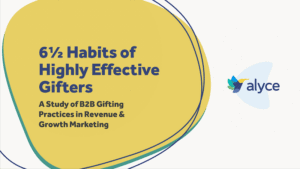
Persona Selling and Marketing is common practice. However, understanding who someone is outside of their 9-to-5 job is how you’re going to create a lasting impact on your relationship with them.
I’m a huge Boston Celtics fan. I go to probably 20 games a year. My family and friends yell at me at dinner because I’m always checking the score on my phone under the table.
I’m a huge Star Wars fan. I’ve watched all the movies more times than I can count. I’ve read the books. I’m currently binging one of the animated series on Disney+.
I’m a sucker for reality TV. I’ve watched more seasons of The Bachelor and MTV’s The Challenge than I’d care to admit, quite frankly.
But at work, I’m a product marketer. I’m responsible for a bunch of different things. However, mainly I determine the right way to position our product, the best way to get our message out to the market, and how to position us against the competition.
So if you’re trying to get in touch with me to sell me something, and you just look at just my job title or my LinkedIn profile, I’ll probably end up being marketed to that persona and you may end up sending me a message that looks like this:
It’s not a bad email, necessarily. Product marketers care about competitive intelligence for sure. It’s part of my job. So, it makes sense to send me something like this. It would be logical for me to look at this and say, “this could help me. I’d like to buy this.”
People Buy, Not Personas
Are you looking to make your marketing and sales more personal? Check out our Personal Moments Playbook for tactical tips on when and how to make the best first impression.
The issue is, as Zig Ziglar once said,
“People don’t buy for logical reasons. They buy for emotional reasons.”
And it’s true. That email made me feel pretty much nothing. It felt pretty generic to what I do for work, and what thousands of other people in product marketing also do for work. It’s a pretty canned email, and I was busy, so I didn’t respond. They were doing persona selling. They lost me because it didn’t feel like they were talking to me as a person.
“A buyer persona is a semi-fictional representation of your ideal customer based on market research and real data about your existing customers.” – Hubspot
Now, I don’t know about you, but I’d rather not be treated as a semi-fictional representation of someone’s ideal customer, as in persona marketing and selling. I’d rather be treated like the real person that I am.
As marketers and sellers, we’ve all been guilty of selling to the persona. My work persona is the product marketer whose challenges include x, y, and z, so why wouldn’t we talk only about how we solve for x, y, and z? This used to be pretty good marketing because we could hit on the logical points of interest for a given person based on their role.
But today, we have to remember that we live in a world where buying options are endless. The difference between your solution and your competitor’s solution is pretty minimal, no matter what your battle card says. And because of that, Zig Ziglar’s point is even more relevant than ever:
Logic isn’t what drives buying decisions. People drive buying decisions.
Creating relationships, and tugging on the strings of what someone actually cares about outside of their 9 to 5 is what gets an emotional response from someone, and makes them want to buy from Salesperson A over Salesperson B.
How do you know if you’re selling to the person or persona? Use this rule.
The rule is pretty simple. When you fear you may be using persona selling or marketing, ask yourself this question when trying to get a response from someone: “Could I send this to a person with the same title at any other company?”
If the answer is “yes,” and you feel like you could send the same email, direct mail, or InMail, to more than one person, then whatever it is you’re sending isn’t as effective as it could be. That is generic persona marketing. You’re not marketing or selling to me as a person.
To actually connect with someone, and hit the emotional side of their brain, the answer to this question needs to be, “Nope, this is just for them.”
One quick search for my Twitter account and you’ll find stuff like this:
And this:
I’d much rather talk to someone about the Mandalorian or Kemba Walker than I would about Competitive Intelligence tools, to be honest.
So, if that same person was trying to get my attention and get me to respond, I’m much more likely to respond to the email that says something like:
“Beat the Competition like Kemba beat the Lakers”
Or
“Care About Your Competition like the Mandalorian Cares for Baby Yoda”
I love Baby Yoda. And I love Kemba Walker.
I automatically like this salesperson over the salesperson that sent me the generic, “Here’s how we help product marketers like you,” and I’m much more likely to talk to them to hear what they have to say.
Why does personal marketing work?
According to Harvard, 95% of buying decisions are made subconsciously:
“By only marketing the attributes of your product, you will likely generate lackluster results. And the poor results you receive are due to the fact you are completely missing the subconscious, human element in the decision-making process.”
That “human-element” can’t be developed with generic persona marketing, selling, and outreach tactics. Simply put, that can only be developed by treating people like people. Talk to them like you’d talk to a friend outside of work. Find common ground in your interests. Build a rapport that earns their trust.
Doing those things is what makes someone want to work with you, the person, more than the sales rep who just wants to sell something to hit quota.
Try it out this week: put in the extra effort to connect with people on a personal level, rather than enrolling them in your persona-based sequence. Send me an email that talks to “Blake, the Celtics fan that watches way too much Star Wars and the Bachelor” instead of “Blake, the Product Marketer” and start having more meaningful conversations with prospects.
Want to learn more about how you can start treating your prospects in a more personal way, and stop treating them like persona? Request a Demo to learn more about Alyce.











